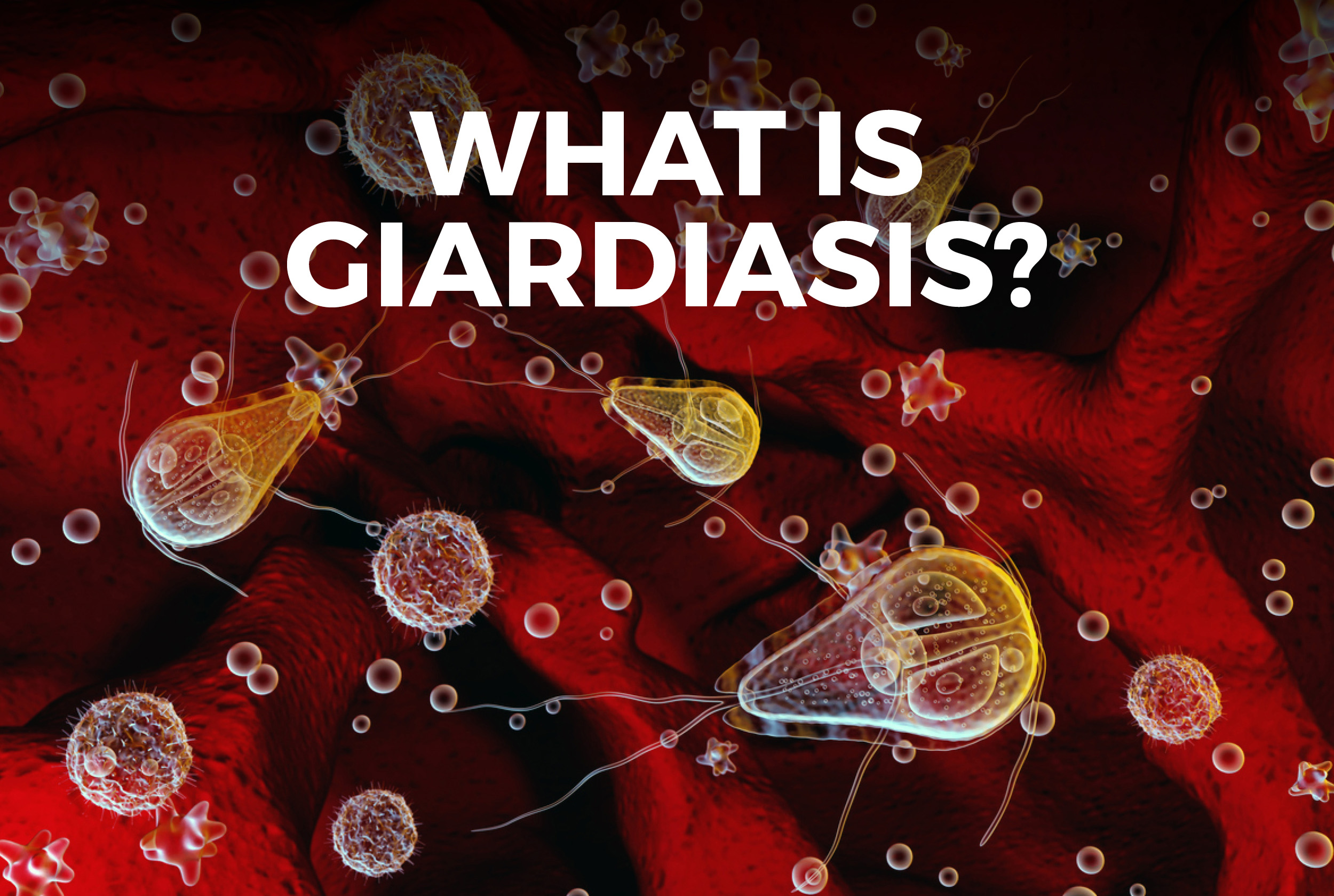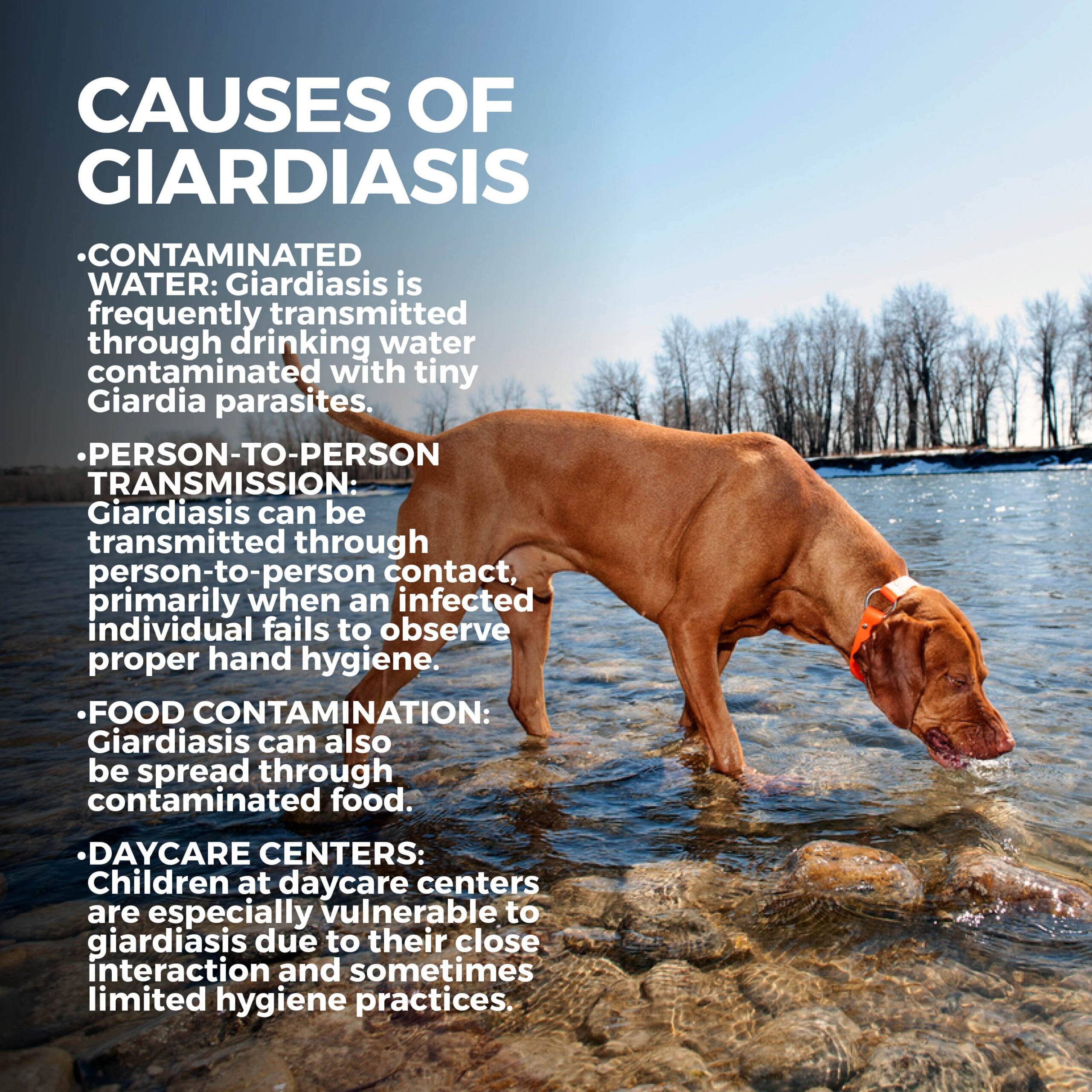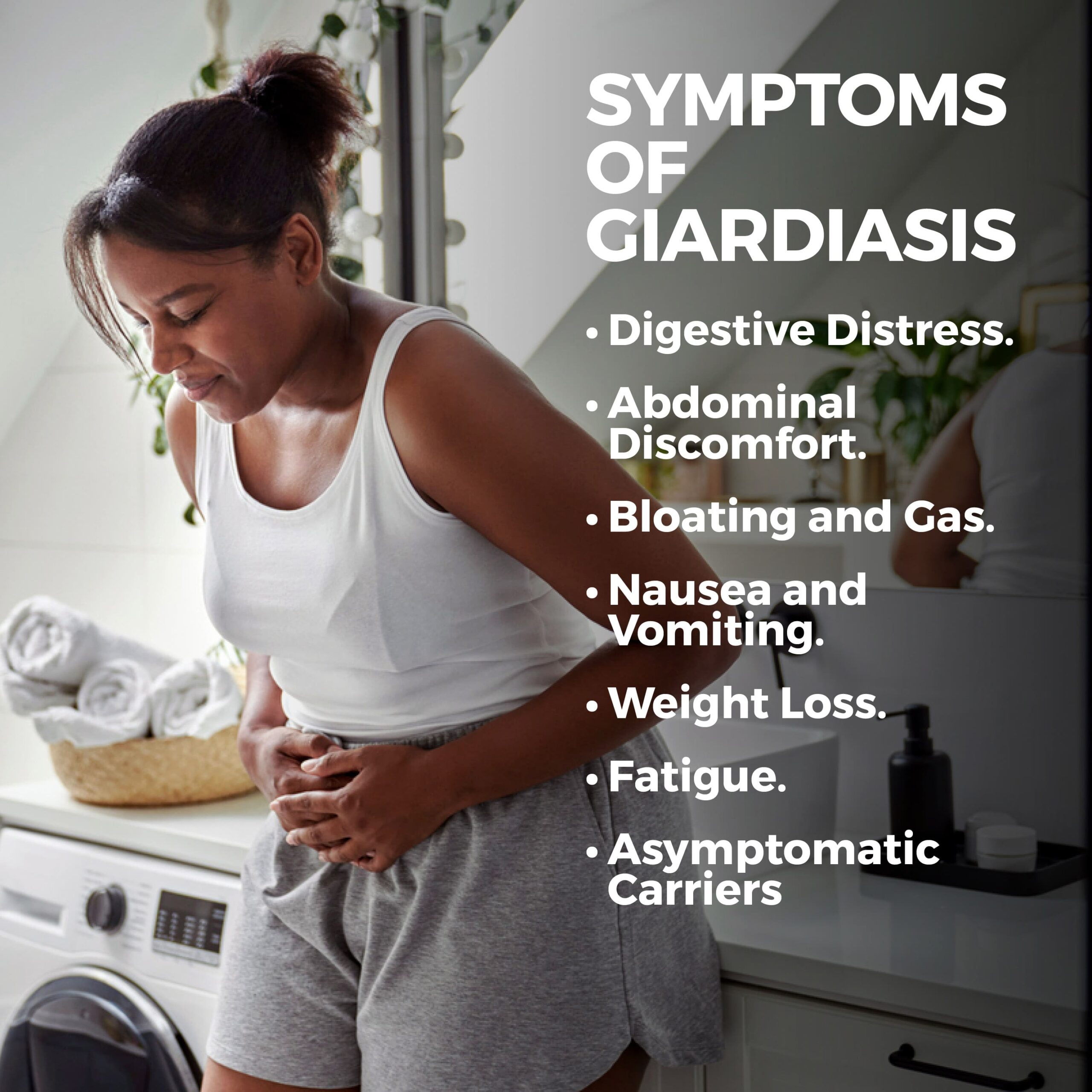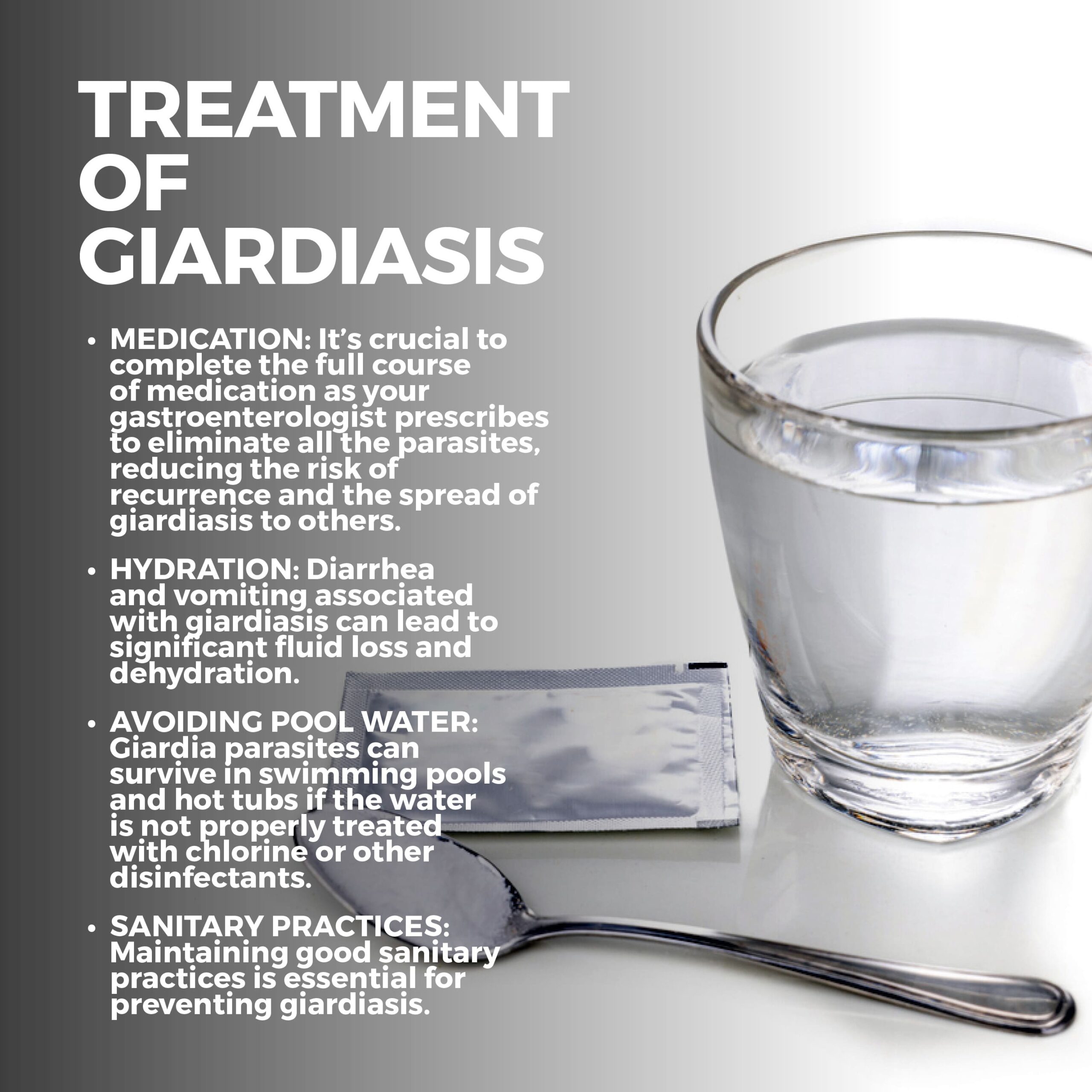
Giardiasis
Giardiasis is an intestinal problem caused by tiny parasites that can make you feel very sick. Let’s explore what giardiasis is, how it spreads, the symptoms it causes, how doctors diagnose it, and what you can do to recover if you find yourself dealing with this condition.
Causes of Giardiasis
Let’s start by understanding how giardiasis is transmitted:
- Contaminated Water: Giardiasis is frequently transmitted through drinking water contaminated with tiny giardia parasites. This often occurs in settings where water treatment is inadequate, such as when camping or hiking. Natural water sources like streams, rivers, and lakes can serve as breeding grounds for giardia in these environments. Without proper filtration or treatment methods, these parasites can easily find their way into your drinking water, putting you at risk of infection. This is a reminder of the importance of treating or purifying water from these sources before consumption to safeguard against giardiasis.
- Person-to-Person Transmission: Giardiasis can be transmitted through person-to-person contact, primarily when an infected individual fails to observe proper hand hygiene. If someone with giardiasis doesn’t thoroughly wash their hands after using the restroom, they can transfer the parasites onto surfaces they touch, which will pass these germs on to others. Encouraging regular handwashing can significantly reduce the risk of giardiasis in households and public settings.
- Food Contamination: Giardiasis can also be spread through contaminated food. If an individual infected with giardia prepares food without properly washing their hands, the parasites can be transferred to the food, posing a significant risk to those who consume it. This scenario highlights the importance of food safety practices, including thorough handwashing before handling food to prevent contamination. Food handlers should always prioritize cleanliness, so they do not unknowingly contribute to the spread of giardiasis and other foodborne illnesses.
- Daycare Centers: Children at daycare centers are especially vulnerable to giardiasis due to their close interaction and sometimes limited hygiene practices. In environments like a daycare or children’s center, germs can easily spread among children. This is why daycare providers and parents must be alert about enforcing and teaching proper handwashing practices to kids. By instilling good hygiene habits early, the risk of giardiasis transmission can be reduced, creating a safer environment for children, and preventing the illness from spreading within the daycare setting.

Symptoms of Giardiasis
Giardiasis can bring a range of symptoms:
- Digestive Distress: When you have giardiasis, frequent and watery diarrhea is one of the most common and distressing symptoms. You may have to rush to the restroom more often with loose, liquid stools. The diarrhea’s smell can be unpleasant, adding to the discomfort and inconvenience of the condition. Dehydration is a concern with persistent diarrhea, so it’s essential to drink plenty of fluids to stay hydrated.
- Abdominal Discomfort: Giardiasis often leads to abdominal discomfort and pain. You might feel cramps or an ache in your stomach. This discomfort can be bothersome and make everyday activities more challenging, contributing to the overall unpleasantness of the illness.
- Bloating and Gas: Feeling gassy and bloated is another common symptom of giardiasis. Your stomach may feel distended, and you might experience frequent passing of gas.
- Nausea and Vomiting: Some individuals with giardiasis may experience bouts of nausea. In more severe cases, this nausea might escalate to vomiting. Nausea and vomiting can contribute to dehydration and fatigue, making it important to seek treatment if these symptoms persist.
- Weight Loss: Prolonged giardiasis can lead to weight loss. The reason for this is that the parasites disrupt the normal functioning of your intestines, impairing the absorption of essential nutrients from the food you consume. This can result in gradual weight loss, making you weaker and susceptible to other health problems.
- Fatigue: Dealing with giardiasis can be exhausting. The combination of persistent diarrhea, vomiting, and nutrient loss can leave you feeling drained and weak. Fatigue may affect your daily activities and overall quality of life, underscoring the importance of timely treatment.
- Asymptomatic Carriers: Not everyone infected with giardia parasites experiences these symptoms. Some individuals may act as asymptomatic carriers, meaning they have the parasites in their system but don’t show any signs of illness. As a result, they may unknowingly pass on the parasites to others, emphasizing the significance of practicing good hygiene to prevent the spread of giardiasis, even when no symptoms are present.

Diagnosis of Giardiasis
If you suspect you have giardiasis, we can help diagnose it through:
- Asking Questions: Your gastroenterologist will ask about your symptoms, recent activities, and dietary habits.
- Stool Samples: To confirm the diagnosis, a stool sample is usually necessary to check for the presence of the giardia parasites. Multiple samples may be required, as the parasites may not always be present in every sample.
- Blood Tests: A blood test may be conducted to detect an increase in white blood cells, which can indicate infection.
- Endoscopy: In severe cases or when symptoms persist, an endoscopy may be used to examine your intestines and collect samples for further testing.
Treatment of Giardiasis
The good news is that giardiasis can be treated. Here’s what you can do:
- Medication: It’s crucial to complete the full course of medication your gastroenterologist prescribes to eliminate all the parasites, reducing the risk of recurrence and the spread of giardiasis to others.
- Hydration: Diarrhea and vomiting associated with giardiasis can lead to significant fluid loss and dehydration. To combat this, it’s important to stay well-hydrated. In addition to drinking clear fluids like water, we recommend drinking oral rehydration solutions (ORS) to replace lost fluids and electrolytes. ORS solutions are designed to help you maintain the right balance of essential nutrients and fluids, which is particularly important if you’ve been experiencing diarrhea and vomiting.
- Avoiding Pool Water: Giardia parasites can survive in swimming pools and hot tubs if the water is not properly treated with chlorine or other disinfectants. Swallowing water from these recreational water sources can lead to giardiasis. To protect yourself, it’s important not to swallow pool water and to avoid ingesting water from hot tubs, as it may contain parasites.
- Sanitary Practices: Maintaining good sanitary practices is essential for preventing giardiasis. This extends to pet care since dogs and cats can carry giardia parasites. To reduce the risk of giardiasis transmission between pets and humans, it’s crucial to adopt proper pet hygiene practices. This includes promptly cleaning up after your pets, especially their feces, as giardia cysts can be found in their stool. Ensuring that your pets receive regular deworming and health check-ups can also help confirm they are not carrying giardia parasites.

Contact Us
If you suspect that you may have giardiasis, please do not delay care. The team of professionals at GastroMD can help you to reclaim your life. We are one of the leading gastroenterology practices in the Tampa Bay area. We perform many diagnostic procedures using state-of-the-art equipment in a friendly, comfortable, and inviting atmosphere where patient care is always a top priority! Contact us today to learn more.



